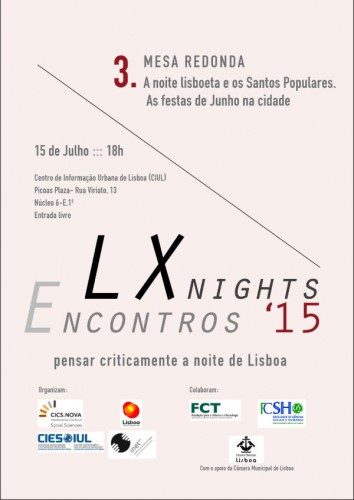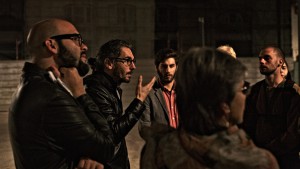In a previous post the first weeks after the arrival of Erasmus in Lisbon were examined, emphasizing the dimension of young consumption within the city. Now is time to introduce some general considerations to understand this population of exchange students and its central role as a driving force in the building and reconfiguration of Lisbon’s night-life.
First of all, who are these students and what mobility are they leading? The Erasmus Programme have been sending high education students through Europe for more than 25 years. The exchange students make medium-term stays (of 3 to 12 months) within a relatively homogeneous cultural area: the 28 members of European Union plus the former Yugoslavia, Republic of Macedonia, Iceland, Liechtenstein, Norway, Switzerland and Turkey. Every stay is based in a bilateral agreement made between faculties which have as a backdrop a programme of equivalences and grants funded by the European Commission.

The Erasmus students seems to embody several contexts and situations explaining their decision to going abroad: social and familiar incentives and pressures to study in a prestigious foreign university, desire to travel and discovery distanced from personal environment, investment in learn English before the global stress to do it, and so on. Anyway, a great majority of them undertake a leisure-centered touristic travel motivated by the desire of new experiences.
In this sense, Erasmus students aren’t only students, they develop in their destinies a wide range of activities, relationships and roles, crossing repeatedly the former boundaries between study and work, tourism and migration, production and consumption. Moreover, they participate in local social movements, they find a partner or a job, they start a business, and often they return to the visited country from time to time.
The international students in general (not only Erasmus), belong broadly to a kind of “migratory elite” since their education and socioeconomic backgrounds are slightly above the average. In fact they are just the 2% of the world annual tertiary students, belonging to a minority inside the lucky minority who can reach the higher education in a very unequal world. Not for nothing the transnational experience of studying abroad aim to incorporate to these students the called as “mobility capital” coming from other “capitals”.

http://delacourcommunications.com/cash-crisis-threatens-european-student-mobility/
The case of Erasmus is surprisingly more restrictive: just the 1% of European tertiary students are enrolled in Erasmus, maybe because intra-European mobility is statistically irrelevant when compared with other regions of the world and also because the wealthy families use to send their sons and daughters to the United States or to England, not with the Erasmus programme.
Whatever the case may be the socioeconomic profiles of Erasmus students fluctuate between two main models. On the one hand we have the European youngers borned in elite cosmopolitan families where they learnt the pleasure of travel, the disposition to speak foreign languages and the respect and appreciation for the culture of different countries. On the other hand, there are many youngsters coming from the middle-classes (and even some ones from low-income families) attending the programme as a class-strategy of social mobility with a strong familiar or personal economic commitment.
Reading transnational mobility as a capital helps to understand these investment in education made by the middle-classes, the characteristics of international leisure of the young elites and also the phenomenon of the “immobility” among the low-income families. Additionally there is a class-based migratory strategy featured by the geographical proximity between countries and the differences in the price of living. In other words many of the Spanish Erasmus students in Lisbon could not afford an Erasmus in London.
Therefore, social class, familiar and personal strategies and the country of origin and destination of these mobile students will shape both the experience of mobility and the outcomes of these migratory movements over the urban space. But, what’s the socioeconomic background of Erasmus students in Lisbon?









 The second edition of Encontros LXNIGHTS is coming. This time our guests are
The second edition of Encontros LXNIGHTS is coming. This time our guests are 






 It’s already confirmed!!! Next May 7, 2015. LXNIGHTS, in partnership with Sociology’s Alumni Association (NASNOVA), are very pleased to organize the first Fieldtrip on Lisbon’s Nightlife: from Martim Moniz-Intendente, along Bairro Alto and Bica and finishing in Cais do Sodré.
It’s already confirmed!!! Next May 7, 2015. LXNIGHTS, in partnership with Sociology’s Alumni Association (NASNOVA), are very pleased to organize the first Fieldtrip on Lisbon’s Nightlife: from Martim Moniz-Intendente, along Bairro Alto and Bica and finishing in Cais do Sodré.





